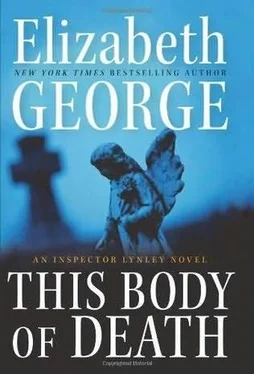“Hang on,” Lynley said. “Why not?”
That stopped her in her tracks. She said, “What d’you mean ‘Why not?’ You can’t expect these things to be growing in flower beds.”
“Havers, this particular tool was old and rusty,” Lynley said. “What does that suggest to you?”
“That it was old and rusty. Left lying about. Taken from an old roof. Discarded in a barn. What else is it supposed to mean?”
“Sold in a London market by a dealer in tools?”
“No bloody way.”
“Why not? You know as well as I do that there are antique markets in every part of town, from formal markets to casual affairs set up on Sunday afternoons. If we come down to it, there’s a market right inside Covent Garden where one of the suspects-you do remember Paolo di Fazio, don’t you?-actually has a stall. The crime was committed in London, not Hampshire, and it stands to reason-”
“No bloody way!” Havers’ voice was loud. Several diners in the Little Chef glanced in their direction. She saw them do so and said, “Sorry,” to Lynley, adding in a hiss, “Sir. Sir. You can’t be telling me that the use of a thatching tool to kill Jemima Hastings was an absolute and completely incredible coincidence. You can’t, you just can’t, be saying that our killer conveniently picked out something to do away with her and that ‘something’ just happened to be one of the very same somethings that Gordon Jossie uses in his work? That horse won’t run once round the track, and you bloody well know it.”
“I’m not saying that.”
“Then what? What?”
He considered this. “Perhaps it was used to frame Gordon Jossie. Can we believe that Jemima never told a soul in London about the man she left behind in Hampshire, about the fact that her former lover was a master thatcher? Once Jossie came looking for her, once he began putting up those cards with his phone number on them round the streets, doesn’t it stand to reason that she would have told someone-Paolo di Fazio, Jayson Druthers, Frazer Chaplin, Abbott Langer, Yolanda, Bella McHaggis…someone-who this person was?”
“What would she have told them?” Havers said. “Okay, my ex-boyfriend, p’rhaps. I’ll give you that. But my ex-boyfriend the thatcher? Why would she tell someone he was a thatcher?”
“Why wouldn’t she?”
Havers threw herself back in her seat. She’d been leaning forward, intent upon making her every point, but now she observed him. Round them, the noise of the Little Chef rose and fell. When Havers finally spoke again, Lynley was unprepared for the direction she took.
She said, “It’s Ardery, isn’t it, sir?”
“What’s Ardery? What are you talking about?”
“You know bloody well. You’re talking like this because of her, because she thinks this’s a London situation.”
“It is a London situation. Havers, I hardly need remind you that the crime was committed in London.”
“Right. Excellent. Bloody brilliant of you. You don’t need to remind me. And I don’t think I need to remind you that we aren’t living in the age of transportation by horseback. You seem to think that no one from Hampshire-and for that you c’n read Jossie or Whiting or Hastings or Father Bleeding Christmas-could’ve got up to London in any number of ways, done the deed, and then gone home.”
“Father Christmas hardly comes from Hampshire,” Lynley said dryly.
“You know damn well what I’m talking about.”
“Havers, listen. Don’t be-”
“What? Absurd? That’s the word you’d use, isn’t it. But at the end of the day the real issue here is you’re protecting her and we both know it although only one of us knows why you’re doing it.”
“That’s outrageous and untrue,” Lynley replied. “And, might I add, although it’s never stopped you before, now you’re out of order.”
“Don’t you bloody pull rank on me,” Barbara told him. “From the first, she’s wanted to think this is a London case. She had it that way when she decided Matsumoto did it, and she’ll have it that way once she gets an e-fit off him, just you wait for that. Meantime, Hampshire’s crawling with nasties that no one’s beginning to want to look at-”
“For the love of God, Barbara, she sent you to Hampshire.”
“And she ordered me back before I was finished. Webberly would’ve never done that. You wouldn’t have done it. Even that wanker Stewart wouldn’t ever have done it. She’s wrong, wrong, wrong, and-” Havers stopped abruptly. She seemed to have run out of steam. She said, “I need a fag,” and she grabbed up her belongings. She strode towards the doors of the place. He followed her, weaving between the tables of onlookers who’d become understandably curious about what was going on between them.
Lynley thought he knew. It was a logical leap that Havers was making. It was just the wrong one.
Outside, she was striding towards her car, on the far side of the car park in the direction of the petrol pumps. He was parked nearer the Little Chef than she, so he got into the Healey Elliott and drove after her. He came up alongside her. She was smoking furiously, muttering to herself. She tossed a glance his way and increased her speed.
He said, “Havers, get in.”
“I’d rather walk.”
“Don’t be stupid. Get in. That’s an order.”
“I don’t obey orders.”
“You will now, Sergeant.” And then, seeing her face and reading the pain that he knew was at the heart of why she was acting as she was, he said, “Barbara, please get into the car.”
She stared at him. He stared at her. Finally, she tossed away her cigarette and climbed into the car. He said nothing until he’d driven across the car park to the only spot of shade available, provided by an enormous lorry the driver of which was likely inside the Little Chef as they themselves had just been.
Havers groused, “This car must’ve cost you a mint. Why’s it not got air-conditioning, for God’s bloody sake?”
“It was built in 1948, Barbara.”
“Stupid excuse.” She didn’t look at him, nor did she look straight ahead of them into the shrubbery beyond which the M3 offered a broken view of traffic whizzing towards the south. Instead, she looked out of her side window, offering him the sight of the back of her head.
“You’ve got to stop cutting your own hair,” he told her.
“Shut up,” she said quietly. “You sound like her.”
A moment passed. He raised his head and looked at the pristine ceiling of the car. He thought about praying for guidance, but he didn’t really need it. He knew what had to be said between them. Yet it constituted the Great Unmentionable that had been governing his life for months. He didn’t want to mention it. He just wanted to get on.
He said quietly, “She was the light, Barbara. That was the most extraordinary thing about her. She had this…this ability that was simply at the core of who she was. It wasn’t that she made light of things-situations, people, you know what I mean-but that she was able to bring light with her, to uplift merely by virtue of who she was. I saw her do this time and again, with Simon, with her sisters, with her parents, and then of course with me.”
Havers cleared her throat. Still she did not look at him.
He said, “Barbara, do you believe-do you honestly believe-that I could walk away from that so easily? That, so desperate to get out of the wilderness, because I admit I am desperate to get out of it, I would take any route that appeared before me? Do you believe that?”
She didn’t reply. But her head lowered. He heard a small sound emanate from her, and he knew what it meant. God, how he knew.
He said, “Let it go, Barbara. Stop worrying so. Learn to trust me, because if you don’t, how will I learn to trust myself?”
Читать дальше












